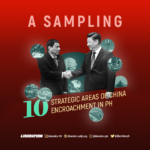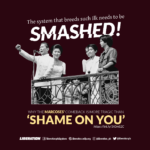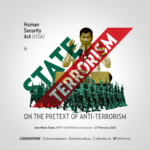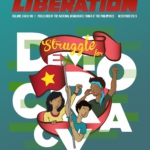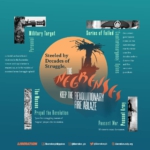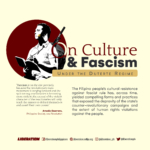On Culture and Fascism under the Duterte Regime
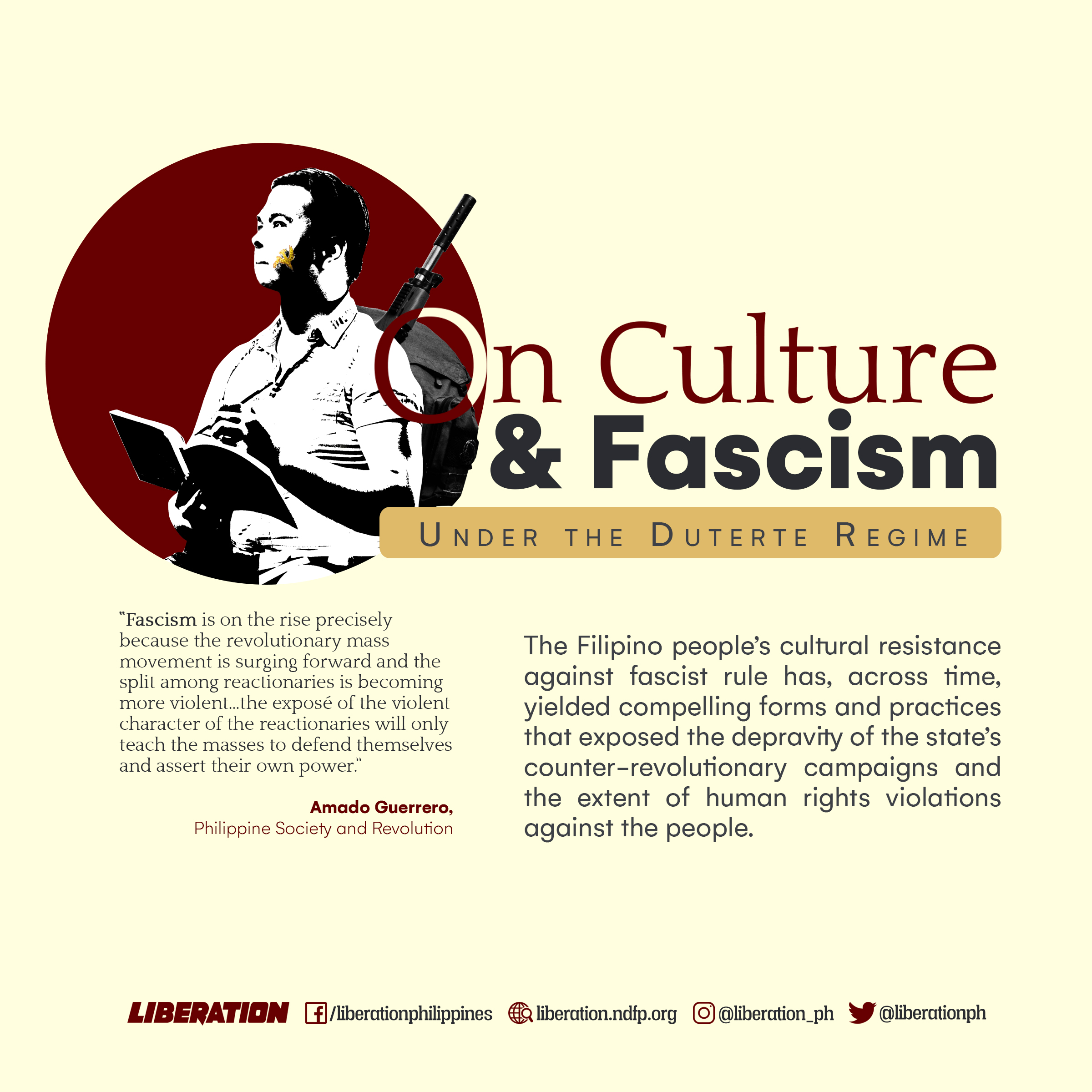
by Alejo Nicolas
President Rodrigo Duterte’s regime can now appropriately be described as a looming fascist dictatorship: one wherein mechanisms, operations, and systems are being put in place towards a full-blown resurrection of the Marcos authoritarian rule, which in 1986 was ousted by the people’s collective action.
The term “fascism”, first used to denote ultranationalist and right-wing governments in Europe, is understood in the Philippine context as rooted in bureaucrat capitalism. In Philippine Society and Revolution, Amado Guerrero discusses how the country’s political landscape changed from direct colonial occupation under Spain, Japan, and the United States to a neocolonial republic ruled by a succession of Filipino puppet regimes since 1946.
Led by bureaucrat capitalists, these regimes continue to protect imperialist and feudal interests by maintaining a deceptive bourgeois democracy supported by the entire state machinery of the military, police, courts, penal system and cultural institutions. However, such a regime can revert to outright authoritarian rule when the people’s resistance threatens the existing order, as shown by Ferdinand Marcos’s imposition of Martial Law in 1972.
Fascism and Philippine culture
The past two-and-a-half years under President Duterte were marked by the regime’s increasing use of deception, threat/intimidation, coercion, and armed violence against the people.
Its campaign, through police brutality and reckless killings, against the proliferation of illegal drugs and its counterinsurgency plan of deception and “all-out war” against the advance of revolutionary and progressive forces have left tens of thousands dead or displaced. The breakdown in the peace negotiations with the National Democratic Front of the Philippines (NDFP) was followed by crackdowns: illegal arrests, enforced disappearances, and false charges against hundreds of civilians. Martial Law in Mindanao was declared in May 2017 during the armed conflict in Marawi. It has been extended three times until the end of December 2019.
In October 2018, the Armed Forces of the Philippines (AFP) fanned the false alarm of a “Red October” destabilization plot as a pretext for expanding such repression to the rest of the country. Although the faked destabilization plot has been thoroughly exposed, the security forces have continued to sustain it as a reference point for its expanded counterinsurgency operations.
The Philippines is witnessing the turn towards fascism across different fronts. It is crucial to consider this rising state of tyranny not only in the military and political spheres, but also in the field of culture which is part of the arena of class struggle. Culture encompasses all spheres of social behavior while art distills, reflects, and refracts human and social experience. How is state violence reinforced, reflected, diffused or deployed by cultural institutions? How does it appear across everyday discourse, popular culture, mass and social media, the visual arts, film, literature, architecture, and more? And lastly, how is the people’s anti-fascist struggle conveyed across culture and the arts?
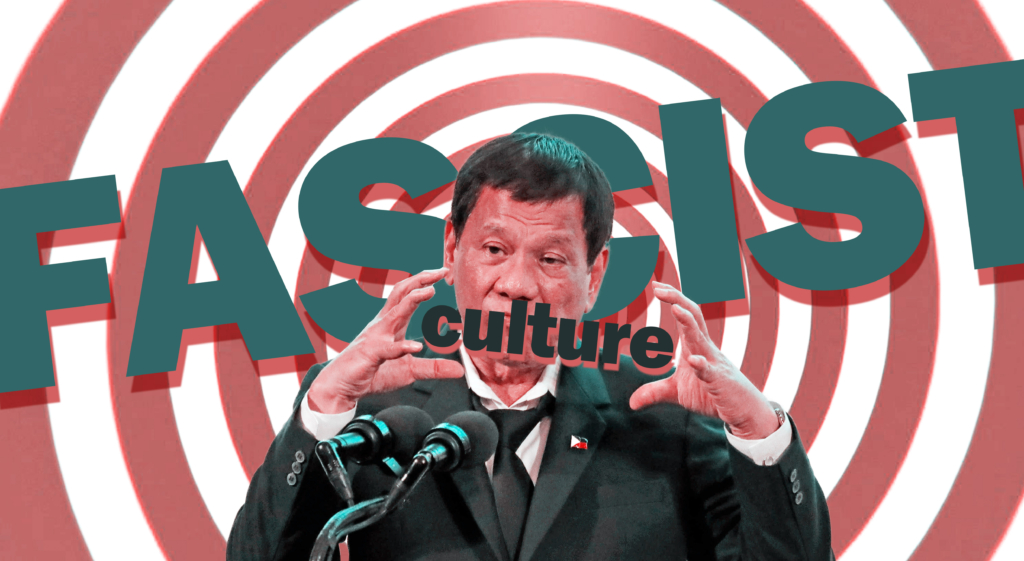 Signs of tyranny
Signs of tyranny
Fascist rule in the Philippines is reinforced in the way the state wields culture and art to, first, openly suppress and demonize the people’s struggle through censorship and harassment. On the other hand, it also selectively patronizes and supports initiatives that whitewash and sanitize the repression of the regime. Over the past two and a half years, the following developments can be noted:
2015: The President as populist but anti-people personality. Since the start of the presidential electoral campaign in 2016, Duterte’s outrageous conduct, language, and gestures have generated controversy and aghast. His years in power, however, have been marked by more vile, sexist, misogynistic, anti-religious, and anti-people statements.
Since assuming office, he has threatened and began to slaughter suspected drug addicts, to bomb Lumad schools. He told a United Nations rapporteur on human rights to go to hell, denigrated the International Criminal Court prosecutor for being black, and ordered troops to shoot woman rebels in the vagina. Recently, he urged street idlers to rob and even to kill bishops critical of his war on drugs and EJKs, and described rape against overseas Filipino workers—whom he referred to as those “working as slaves [overseas]”—as “com(ing) with the territory, ‘kasali sa kultura (it’s part of the culture).”
These can not be dismissed as simple rhetoric, as they reflect and symbolically justify actual states of violence happening everyday. As a key political figure—the head of state no less— Duterte’s every word and action is covered and amplified by mass and social media, reaching and influencing millions of people inside and outside the Philippines and enabling public acceptance of fascist rule.
A succession of spokespersons for the regime’s propaganda machinery, each worse than the previous one, adds to the circus of disinformation and lies. These messages, many of which express the disregard for human rights, feed a populist cult of personality which breeds blind obedience to the President, fueled by a paid social media army of trolls.
2016: Memorializing a tyrant and reinstating fascist figures. Among the first nationally-condemned acts of Duterte as President was to enable the family of the fascist dictator Ferdinand Marcos to bury his remains with military honors at the Libingan ng mga Bayani in September 2016, with the backing of the Supreme Court. The occasion also gave the Marcoses air time to sanitize and whitewash their family’s history of bloody fascist rule.
Allowing the dictator’s remains to rest in the country’s supposed memorial cemetery for heroes sends a strong symbolic message to the Filipino people: that a deposed and dead dictator can be valorized, honored, and restored to state power. It is an insult and assault to past and present generations who resisted Martial Rule.
This enabling and restoring of proven fascist figures was again unabashedly shown in July 2018, when former President Glora Macapagal-Arroyo, questionably acquitted of plunder by the state courts in 2016, crawled back into the halls of power and installed herself as the Speaker of the House of Representatives. She has since engineered the passage by the House of a joint resolution of both legislative chambers calling for changes in the 1987 constitution that, among others, removes the ban on political dynasties and term limits to all elective officials, and insidiously aims to cancel the May mid-term elections to prolong her and other incumbent officials’ terms until 2022.
2017: Rising state impunity and EJKs. The “war” on illegal drugs was a campaign platform of Duterte. Tokhang operations, surveillance, and extrajudicial killings (EJKs) of suspected drug addicts started in mid-2016 and he has vowed to continue the drive till the end of his term—without assurance of winning the “war”. The number of estimated drug suspects killed since July 2016 ranges from 4,251 to over 20,000 people.
The government continues to deny that a culture of impunity exists and to downplay the gravity of the deaths. Outside of official reports, however, the frequency, undeniability and brutality of the EJKs in the drug war is documented by media workers and reflected in the many artistic works or initiatives that represent the drug war as a theme, setting, or reference.
Examples from Philippine films of 2017, for instance, include Bubog, EJK, Neomanila, Respeto, The Right to Kill, Madilim Ang Gabi, Adik, Double Barrel, Durugin Ang Droga, Kamandag Ng Droga and Si Tokhang At Ang Tropang Buang. Some films support an anti-drug stance that does not deviate from the government’s own discourse, while others more critically reflect how the drug war has affected lives, for worse, across urban to rural communities.
Government propaganda campaigns aiming to justify this state of impunity have intensified. The Philippine National Police (PNP), for instance, stepped up initiatives such as the 1st PNP Anti-Illegal Drugs Festival in July 2017. And resigned PCOO Undersecretary Mocha Uson attempted to parade fake Lumad leaders in hopes of discrediting genuine community leaders.
2018: Heightened attacks and counter-insurgency. The ever-increasing influence of the AFP is reflected in the militarization of the Duterte Cabinet and the sabotage of the peace process towards an all out war against Philippine revolutionary forces led by the Communist Party of the Philippines (CPP), the New People’s Army (NPA) and the NDFP. By December 2017, issuances such as Proclamation 374 declaring the CPP-NPA as a terrorist group set the stage for heightened assaults against both revolutionary forces and civilians critical of the regime. Since entering the second half 2018, the AFP has been fanning the flame of imagined destabilization plots and has been similarly extending the timeline of these to the end of the year.
This counter-revolutionary war against “terror” led by the AFP in the countryside continues to target and displace the broad masses from countless communities. There is nothing more fascist than the current killing spree of activists, civilians and progressives across the country. The EJKs, massacres, harassments, and arrests of activists and members of progressive organizations have risen sharply since 2017, mostly targetting farmers, lawyers, indigenous peoples, health and Church workers, media workers, union leaders, and environmentalists.
The counter-insurgency drive is also expressed in forms of harassment, such as the circulation of black propaganda and red-tagging of civilians and attacks against institutions of mass media, which attempt to paint all dissenters to the regime as “destabilizers” who must be neutralized. Individuals, schools, universities and institutions or organizations holding cultural, media or educational activities critical of the regime are now being openly red-tagged.
 Art and culture for the anti-fascist struggle
Art and culture for the anti-fascist struggle
The culture of impunity and fascism unleashed during the past two and a half years under Duterte underscores the looming danger to all revolutionary and progressive forces. On the other hand, it also points to the regime’s increasing desperation over the rising popular unrest fuelled by worsening socio-economic crisis in semi-feudal and semi-colonial Philippines. The lingering discontent over high inflation rates, rising prices, dislocation of communities due to neoliberalization, and lack of employment and substantive development in urban and rural areas only gives rise to more expressions of collective dissent.
“This rise of fascism is not a sign of strength but in essence is show of despair and weakness,” Guerrero noted in Philippine Society and Revolution during the pre-Martial law era, adding:
“Fascism is on the rise precisely because the revolutionary mass movement is surging forward and the split among reactionaries is becoming more violent…the exposé of the violent character of the reactionaries will only teach the masses to defend themselves and assert their own power.”
These words ring as true then as in the present time. When words and gestures fail to deceive the Filipino people into submission, the state apparatus of force and repression kicks into high gear. The worsening culture of impunity, terror and fascism that has defined the Duterte regime so far reflects how the reactionary state now resorts to desperate measures. The proliferation of trolls, paid hacks, fake news, disinformation and black propaganda only emphasize how the reactionary regime is quickly mobilizing resources to discredit the recent gains of revolutionary and militant struggle by the people.
On the other hand, the threats under a fascist dictatorship have done little to deter and prevent Filipino artists, cultural and media workers, organizations and communities from expressing the anti-fascist struggle through creative and collective means. If there is anything that history and the past years under Pres. Duterte have emphasized in the field of culture, it is how art that has resisted fascism possesses great potential to mobilize and agitate diverse sectors of Philippine society to collectively act against the threat of tyranny and dictatorship.
The Filipino people’s cultural resistance against fascist rule has, across time, yielded compelling forms and practices that exposed the depravity of the state’s counter-revolutionary campaigns and the extent of human rights violations against the people.
Through such efforts, the Duterte regime, for instance, has been mocked and unmasked early on as another iron-fisted and essentially anti-people fascist puppet regime. It has been exposed as a railroader of socio-economic policies that reinforce neoliberal and feudal class interests and drag the Filipino toiling masses into more poverty and hardship.
Lastly, the people’s cultural resistance has also documented, made vivid and advanced the growth of the mass movement and the revolutionary armed struggle in the countryside. As the Party observed its fifth decade of advancing the Philippine revolution, these efforts help show and testify to how struggle and optimism continues to grow amid heightened counter-insurgency by another puppet regime.

